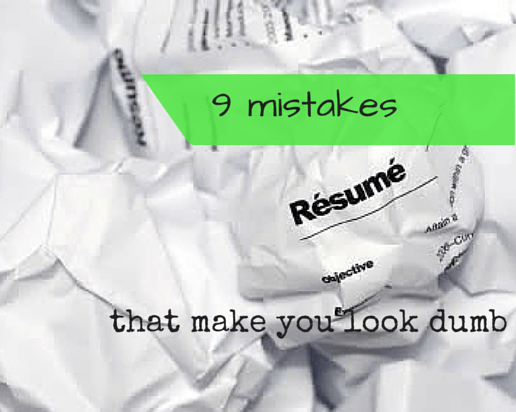9 Resume Mistakes That Make You Look Dumb

Resume Designs and Formats
Resume designs have changed, and you can change your design based upon the type of organization to which you are applying – conservative, moderate, fairly progressive, and “out there.” These are things you can learn about anywhere. The other thing about resumes today is that you can format your background information in several different ways – you don’t have to go with the standard chronological order necessarily. Again, you can find examples of all types of formats online, and really good recommendations about which to use dependent upon your circumstances and the organizations to which you are applying.
Dumb Mistakes
You may have the greatest, most-eye-catching design and the perfect format fit for a position opening, but if you make any of these dumb mistakes, your work will find its next home in “resume heaven.”
Putting an Objective at the Top of Your Resume
Objectives are meaningless because they do not speak to what you can offer the organization; they only speak to what you want. A potential employer doesn’t care about what you want. S/he wants someone who can be a problem-solver for the organization. If you must have a headline, and those are good to have sometimes, make it about the specific position and what you can bring to that position.
Long Prose and Sentences
Think about it. When you want to read something quickly, what do you want to see? You want to see short sentences and phrases, bullet points, and really important stuff in bold or underlined. A reviewer of our resume is no different. Fast-track your accomplishments with action verbs, phrases, and bullets.
Linking to All of Your Social Media Accounts
Who cares if you are on Facebook – so is half the human race. If a potential employer wants to access your page, s/he will. Now, if you have a really great LinkedIn profile or an online portfolio, then that is quite another story. Definitely, link to those.
Grammatical Errors and Typos
Your college professors didn’t like grammar mistakes, and resume reviewers don’t either. You look either really lazy or compositionally challenged. You don’t want to “look” either. So, check your resume a bunch of times for any English mistakes and have somebody else check it too.
Lying
You certainly want to paint yourself as someone who has accomplished a lot, especially in those specific areas included in the job posting. But overstating your accomplishments, exaggerating your educational performance, stating you resigned when you were terminated – these things have a way of catching up, especially when background checks, references, and online research can reveal so much. If you don’t want to say you were fired, don’t. You can talk about the circumstances during the interview if you are asked.
Too Long
Less is really more when it comes to resumes. Be concise, and brief. When you speak to accomplishments, stop with the laundry lists. Include those that directly relate to the position you are seeking. If there isn’t a really good fit, then list the most significant ones. There will be time to speak to the others during an interview if they become relevant. Good rule of thumb: If you don’t have a lot of employment experience, one page is the max; if you are a more seasoned professional with several positions and/or a number of years of employment, two pages should be the max.
Same Words Over and Over
How many times can you say “developed,” or “organized,” or “lead,” or “produced?” In a resume, the answer is many! Find some synonyms for words that you are using over and over again – maybe some that “pop” or add some “sparkle.”
Using Passive Voice
You want to give the impression that you take action; you do that with action verbs. All accomplishments that you list should begin with an action verb (not the word “I” either). “Increased sales by 15% over a period of one quarter;” “Created new marketing strategies which increased conversions by 46%.” Now you’re an action figure!
Failure to Customize
If you don’t customize your resume for each position, using keywords that will be picked up by automated screening tools, then you won’t look dumb to someone reviewing your resume. Your resume will never make it to that someone at all. Any reader can pick out generic resumes – they are vague and do not speak to specifics of the position s/he has available – deleted!
Use the information available to you regarding design and format. Then go through this list and make sure that you are not committing the fatal errors that will kill your chances for an interview.



